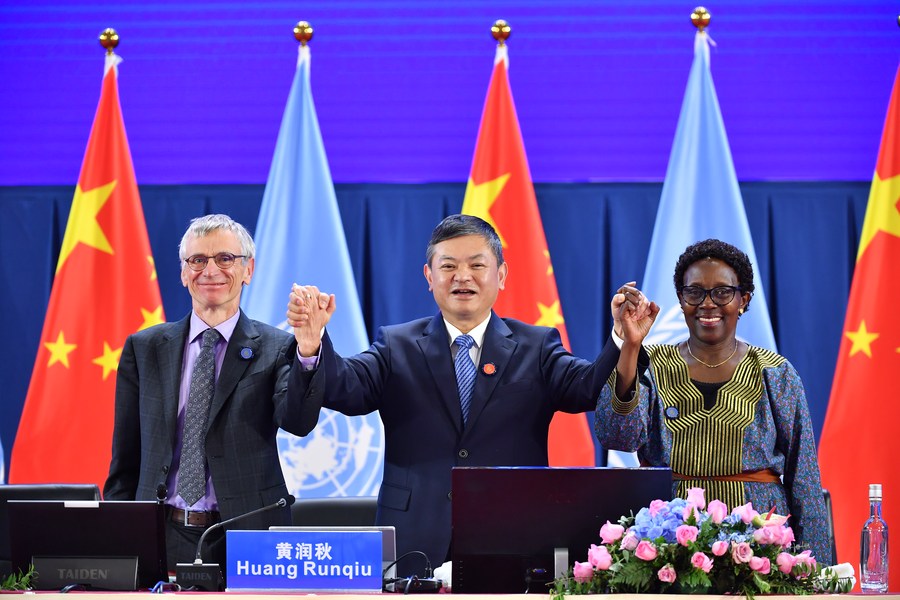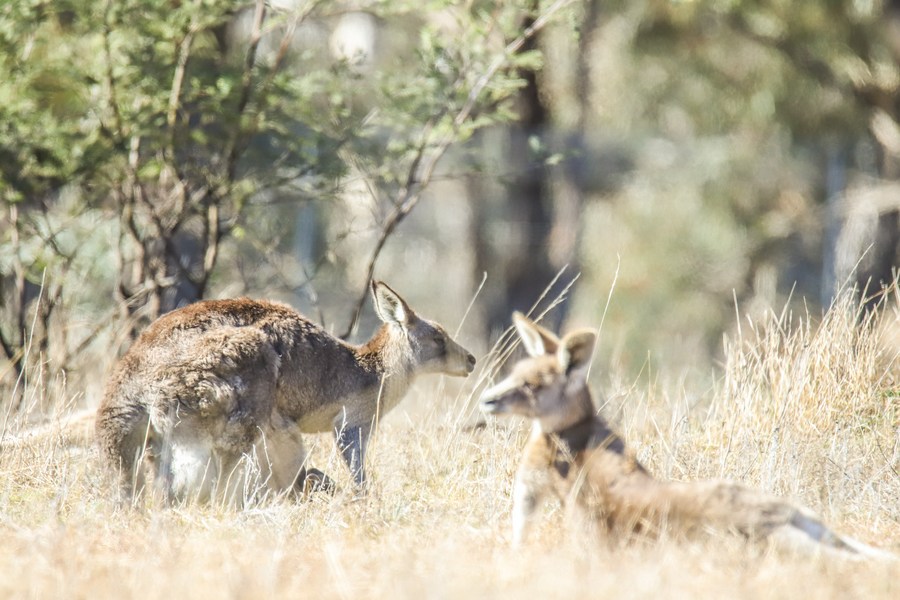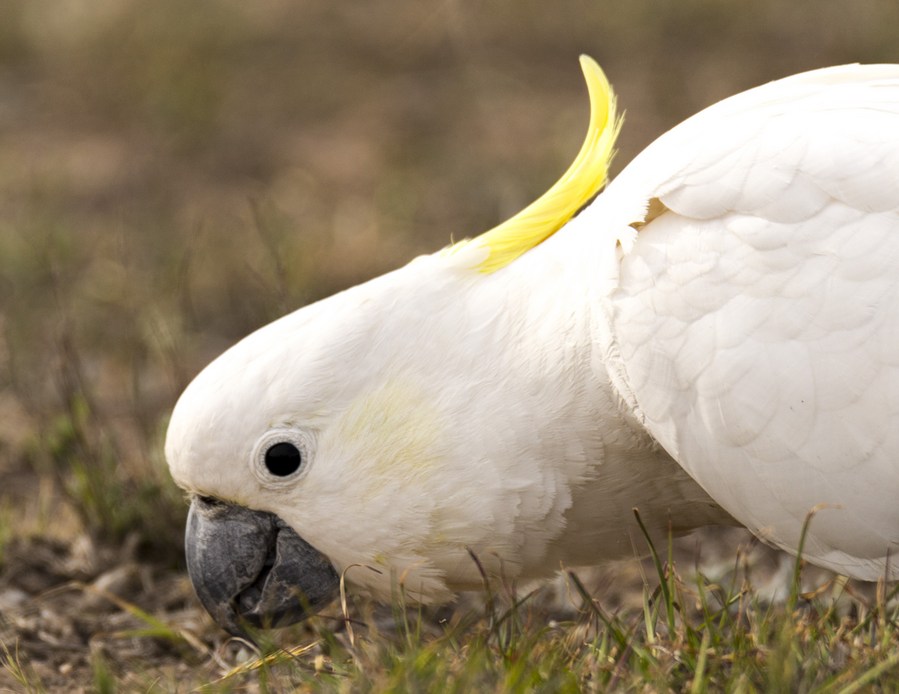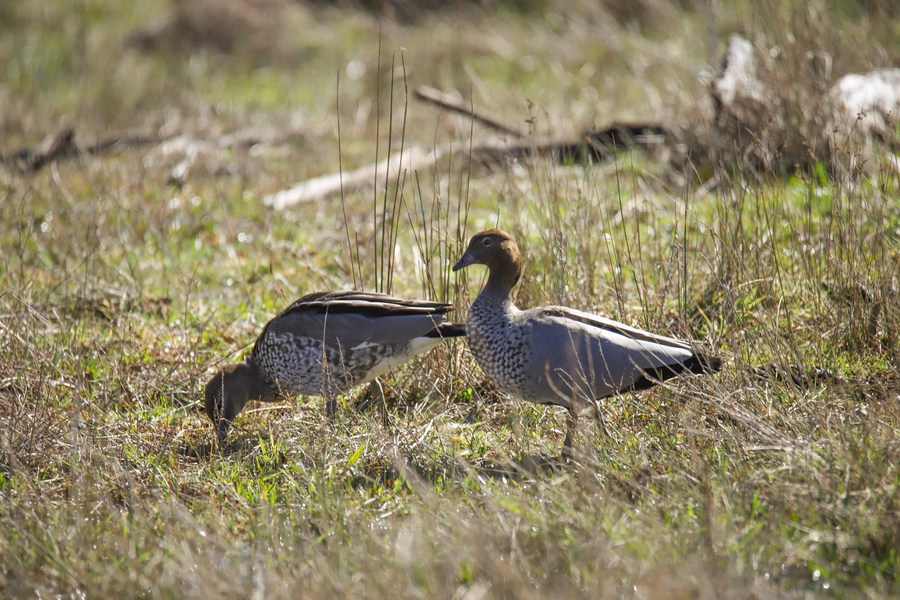Kunming Declaration lays down foundation for biodiversity protection targets: Australian ecologist
 Chinese Minister of Ecology and Environment Huang Runqiu (C) poses for a group photo with Elizabeth Maruma Mrema (R), executive secretary of the Convention on Biological Diversity, and David Cooper, deputy executive secretary of the Convention on Biological Diversity, after the closing plenary of the High-Level Segment of the first part of the 15th meeting of the Conference of the Parties to the Convention on Biological Diversity (COP15) in Kunming, southwest China's Yunnan Province, Oct. 13, 2021. (Xinhua/Li Xin)
Chinese Minister of Ecology and Environment Huang Runqiu (C) poses for a group photo with Elizabeth Maruma Mrema (R), executive secretary of the Convention on Biological Diversity, and David Cooper, deputy executive secretary of the Convention on Biological Diversity, after the closing plenary of the High-Level Segment of the first part of the 15th meeting of the Conference of the Parties to the Convention on Biological Diversity (COP15) in Kunming, southwest China's Yunnan Province, Oct. 13, 2021. (Xinhua/Li Xin)
With a bang of the gavel, the Kunming Declaration was adopted Wednesday in the provincial capital of southwest China's Yunnan Province, providing new momentum for drawing the roadmap for biodiversity conservation in the coming decade.
The declaration is the main achievement of the first part of COP15, or the 15th meeting of the Conference of the Parties to the Convention on Biological Diversity (CBD), and takes note of the meeting's theme of "Ecological Civilization: Building a Shared Future for All Life on Earth."
Upon the adoption of the milestone document, Elizabeth Maruma Mrema, executive secretary of the CBD, said the declaration is "ambitious" and "points us in the right direction, with Parties committed to negotiating a post-2020 framework that is effective in bending the curve of biodiversity loss."
Zhao Yingmin, vice minister of China's Ministry of Ecology and Environment, said the Kunming Declaration is the first political document to embody the ecological civilization philosophy within the framework of the UN multilateral environmental agreement.
"The Kunming Declaration will help us not just to generate ambition in the complex negotiations ahead but will help enormously in narrowing the action gap between climate and nature conservation," said Carlos Manuel Rodriguez, CEO and chairperson of the Washington-based Global Environment Facility.
"We need a more integrated approach. COP15 and the Kunming Declaration will help us move the integration agenda," said Rodriguez, who served as Costa Rican minister for environment and energy for three terms.
"Compared with previous declarations regarding biodiversity, the Kunming Declaration is more in line with the objective requirements of post-2020 biodiversity conservation, especially in strengthening the sustainable use of biodiversity for meeting the needs of people as well as benefit-sharing," said Long Chunlin, an expert in ethnobiology and professor with the Minzu University of China, who attended COP15 and witnessed the adoption of the declaration.
NEW JOURNEY
With political impetus for and reinforced commitment to biodiversity conservation built at the Kunming conference, the world has embarked on a new journey toward the full realization of the CBD's 2050 Vision of "Living in Harmony with Nature," which is consistent with China's proposal of building a community of all life on Earth.
China set the tone of enhanced ambition for this journey by announcing the commitment of investing 1.5 billion yuan (about 233 million U.S. dollars) to establish the Kunming Biodiversity Fund in support of biodiversity protection in developing countries.
"The need to really drive negotiations toward an ambitious, implementable, trackable post-2020 biodiversity framework (is) with financing behind it," said Beate Trankmann, resident representative of the United Nations Development Programme in China.
The journey ahead is not necessarily one compromising economic prospects. China has justified a win-win outcome between environment and development. "Particularly by integrating efforts to advance ecological progress into the poverty eradication drive, we have kept our biodiversity intact, boosted the development of local communities and helped local residents increase their incomes and eliminate poverty," said vice minister Zhao.
"This goes to the original purpose of development, which is for people's wellbeing," said Zhang Yongsheng, head of the Research Institute for Eco-civilization, Chinese Academy of Social Sciences.
Keeping biodiversity intact is inherently linked with many global issues including fulfilling the 2030 Sustainable Development Goals and tackling climate change and cannot be achieved by a single country.
"We must work together and ensure that every country does its part," Mrema added.
Photo taken on Aug. 12, 2021 shows kangaroos in the Mulligans Flat Nature Reserve in Canberra, Australia. (Photo by Liu Changchang/Xinhua)
The declaration commits to ensuring the development, adoption and implementation of an effective post-2020 global biodiversity framework to reverse the current loss of biodiversity and ensure that biodiversity is put on a path to recovery by 2030 at the latest, towards the full realization of the 2050 Vision of "Living in Harmony with Nature".
CANBERRA, Oct. 16 (Xinhua) -- The Kunming Declaration following the 15th meeting of the Conference of the Parties to the Convention on Biological Diversity (COP15) has laid down a foundation for the world to reach biodiversity protection targets, said an Australian ecologist.
In an interview with Xinhua, Andrew O'Meara, Education and Outreach Coordinator at the Capital Woodlands and Wetlands Trust, hailed the 2030 time frame set in the declaration as a good commitment.
The declaration commits to ensuring the development, adoption and implementation of an effective post-2020 global biodiversity framework to reverse the current loss of biodiversity and ensure that biodiversity is put on a path to recovery by 2030 at the latest, towards the full realization of the 2050 Vision of "Living in Harmony with Nature".
 Photo taken on Aug. 12, 2021 shows a sulphur-crested cockatoo in the Mulligans Flat Nature Reserve in Canberra, Australia. (Photo by Liu Changchang/Xinhua)
Photo taken on Aug. 12, 2021 shows a sulphur-crested cockatoo in the Mulligans Flat Nature Reserve in Canberra, Australia. (Photo by Liu Changchang/Xinhua)
O'Meara said it is important that the commitment should be realized at local levels. "You need to start small hitting these commitments, and then let that develop slowly into something very meaningful," he said.
He noted that biodiversity was quite important, taking the eastern bettong as an example, which is an animal lost from the landscape of Australia's mainland for about a century.
"We only discovered after about 100 years of it not being here, that it has a critical role in the growing of trees, and the fixing of nutrients like nitrogen into the soil which is beneficial to all plants," said O'Meara.
The lack of animals like eastern bettong hampered the growth of trees and flowering, and therefore affected animals relying on food from the trees.
 Photo taken on Aug. 12, 2021 shows two ducks walking in the Mulligans Flat Nature Reserve in Canberra, Australia. (Photo by Liu Changchang/Xinhua)
Photo taken on Aug. 12, 2021 shows two ducks walking in the Mulligans Flat Nature Reserve in Canberra, Australia. (Photo by Liu Changchang/Xinhua)
"By removing one animal from the biosystem, it can have a detrimental effect to about all other animals that live in this habitat," he said, adding that the significance of preserving biodiversity to human beings is not just in mental well-being capacity where people could go out and have a relax in the woods, but also in terms of agriculture, soil quality, etc.
While recognizing China's efforts in protecting endangered species as "fantastic", O'Meara was also impressed by its commitment in the Kunming Biodiversity Fund.
China is committed to taking the lead by putting in 1.5 billion yuan (233 million U.S. dollars) to establish the Kunming Biodiversity Fund to help developing countries better protect their ecology.
O'Meara said that the fund is a significant amount and could be very helpful considering there were a lot of nonprofit organizations involved in biodiversity protection, which cost them millions of dollars annually. "In order to do more significant work, they require further millions of dollars to run some of the larger projects," he said. "That money needs to be utilized effectively and smartly."
 Photo taken on Aug. 12, 2021 shows a sulphur-crested cockatoo in the Mulligans Flat Nature Reserve in Canberra, Australia.(Photo by Liu Changchang/Xinhua)
Photo taken on Aug. 12, 2021 shows a sulphur-crested cockatoo in the Mulligans Flat Nature Reserve in Canberra, Australia.(Photo by Liu Changchang/Xinhua)
Mulligans Flat Woodland Sanctuary is one of the nature reserves under the Capital Woodlands and Wetlands Trust, which protects native species such as quolls, echidnas and eastern bettongs.
While his work was to teach the public about the work they do in the reserves, O'Meara stressed the importance of communication and education work on biodiversity after the COP15.
"If you went out to the street and asked 100 people what the Kunming Declaration is, probably not many people would know what you were talking about," he said. "So I think more work needs to be done for science communication in terms of biodiversity."